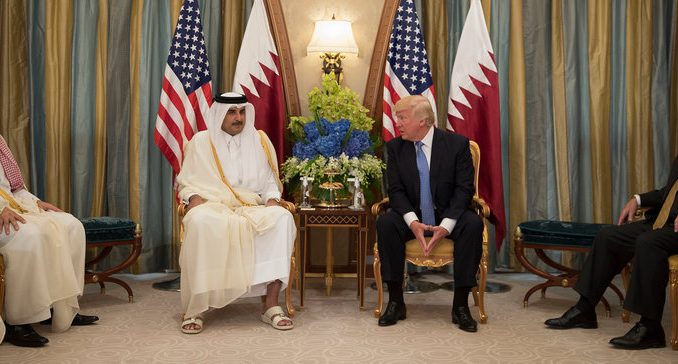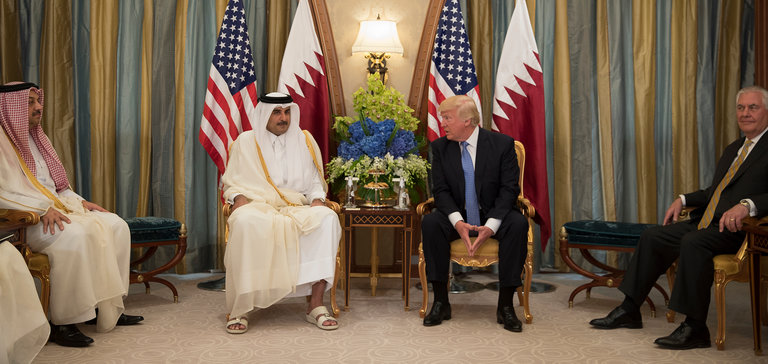
Issue is Qatar’s good relations w Iran, not “aiding terrorists.” Defense Dept in shock, trying to secure continued access to most important US base in Gulf, Al-Udeid. “Qatar can make it less convenient to use the base & Trump tweets give them reason to flex their muscles, reminding US just how convenient the base has been for the last 15 years.” Defense Secretary Mattis made 3-day visit in April, when he met w Qatar emir. Pentagon statement at time said Mattis “reinforced the importance of deepening US-Qatari strategic partnership and discussed shared security interests.” Statement also mentioned “value of Qatar’s role in maintaining regional stability and security.” Kuwait is nervous for other reasons: “If Saudi Arabia and Emirates get what they want from Qatar, then it fears Kuwait will be next.” Turkey is scared it will lose its best regional ally: it also has a military base in Qatar, and supports many of the same Islamist groups in the region. Here, Trump the hypocrite meeting w the emir of Qatar, Sheikh Tamim bin Hamad al-Thani, in Saudi Arabia last month.
Donald Trump foolishly thrust himself into a bitter and potentially war-creating Persian Gulf dispute on Tuesday,
claiming credit for Saudi Arabia’s move to isolate its smaller neighbor, Qatar —
which is a major American military partner.
“During my recent trip to the Middle East I stated that there can no longer be funding of Radical Ideology,” Trump said in a morning tweet.
“Leaders pointed to Qatar — look!”
On Monday, Bahrain, Egypt, Saudi Arabia, the United Arab Emirates and Yemen broke diplomatic and commercial ties with Qatar, citing its relationship with Iran.
Trump, who made the cutting of terrorist funding a centerpiece of his trip to Saudi Arabia last month, like a moron, said he was responsible.
“So good to see the Saudi Arabia visit with the King and 50 countries already paying off,” he said on Twitter.
“They said they would take a hard line on funding.”
Moments later, he added,
“Perhaps this will be the beginning of the end to the horror of terrorism!”
Perhaps not, you ignorant fool.
Qatar has long been accused of funneling arms and money to radical groups in Syria, Libya and other Arab countries.
But so has Saudi Arabia.
Al Udeid Base In Qatar THE Major US Military Headquarters In Persian Gulf
Trump’s tweets have huge potential strategic consequences in the Middle East, where Qatar is a crucial military outpost for the US.
A peninsula that juts into the Persian Gulf, Qatar is home to the forward headquarters of the United States Central Command.
It is a major intelligence hub for the US in the Middle East — and the base where the US plans and carries out airstrikes on the Islamic State.
Al Udeid base, outside Doha, the country’s capital, is home to around 10,000 American troops.
Defense Secretary Jim Mattis made a point of visiting in April, spending three nights in Doha,
where he met with the emir, Sheikh Tamim bin Hamad al-Thani.
Mattis “reinforced the importance of deepening US-Qatari strategic partnership and discussed shared security interests, which include the defeat of ISIS,”
the Pentagon said in its statement at the time about the meeting, using another name for the Islamic State.
The official statement also spoke of the “value of the Qatari support to the counter-ISIS coalition as well as the country’s role in maintaining regional stability and security.”
Qatar has also built deep ties to American academia,
providing funding and real estate to build Middle Eastern campuses for six major universities, including Cornell, Georgetown and Northwestern.
Qatar’s financing of radical groups has long been a source of tension with Washington.
But the US has generally avoided taking sides in the regional feuds in the Persian Gulf since it has strategic ties with several of the gulf states.
Top US National Security Aides Take Totally Different Line On Qatar
Trump’s comments were a sharp break from his top national security aides,
who tried to play down any impact of the rift within the Sunni Arab coalition that is “helping” the US fight the Islamic State.
“We certainly would encourage the parties to sit down together and address these differences,”
Secretary of State Rex W. Tillerson told reporters in Sydney, Australia, where he and Mattis were meeting with officials.
Mattis flat out lied:
“I am positive there will be no implications coming out of this dramatic situation at all,
and I say that based on the commitment that each of these nations that you just referred to have made to this fight.”
Trump’s messages also appeared to contradict the American ambassador to Qatar, Dana Shell Smith,
who this week retweeted a post of hers saying that Qatar had made “real progress” in curbing financial support for terrorists.
Pentagon Taken Aback By Trump Inserting US Into Dangerous Situation
At the Pentagon, some Defense Department officials said they were taken aback by Trump’s decision to thrust the US
into the middle of a fight with its close partners, particularly given the American military’s deep ties to Qatar.
After the president’s tweets on Tuesday, Capt. Jeff Davis, a Pentagon spokesman, tried to steer clear of the fact the US had taken sides.
“I consider them a host to our very important base at Al Udeid,” he said. “
We have no intention of altering our current operations, not only in Qatar but anywhere in the G.C.C.,”
he added, referring to the Gulf Cooperation Council of Sunni states in the region.
Privately, however, several Defense Department officials said Trump’s tweets had undercut the Pentagon,
particularly given how crucial Al Udeid base is to the war against the Islamic State.
In addition to the military’s combat and intelligence mission based in Qatar,
the American end of the “de-confliction” line is there,
a conduit for discussions with Russia to try to avoid accidental conflict in the skies above Syria and Iraq.
American officials had been anticipating the Saudi-led move, a Defense Department official said,
and had received reassurances from Qatari officials the US would not be shut out of Al Udeid.
But that was before Trump’s posts on Tuesday morning.
“Qatar can certainly make it less convenient to use the base,
and the president’s tweets give them reason to flex their muscles
and remind the United States just how convenient the base has been for the last 15 years,”
said Jon B. Alterman, Middle East program director with the Center for Strategic and International Studies in Washington.
Insane Move Scares Turkey And Kuwait, Key Allies Of Qatar Among Sunnis
Also Tuesday, the leaders of Kuwait and Turkey offered to play mediation roles in the dispute.
President Recep Tayyip Erdogan of Turkey, an important Qatari ally,
called his counterparts in Saudi Arabia, Qatar and Kuwait,
as well as the Russian president, Vladimir V. Putin, a Turkish presidential official said.
The emir of Kuwait, Sheikh Sabah al-Ahmad al-Jaber al-Sabah, who has not joined the campaign against Qatar,
flew to Saudi Arabia on Tuesday to meet with the Saudi head of state, King Salman.
Disagreements between Qatar and its gulf neighbors escalated after a series of uprisings against Arab autocrats in 2011.
In the power vacuums that came after the uprisings,
Qatar backed Islamist groups like the Muslim Brotherhood in Egypt, Syria and Libya —
angering Saudi Arabia and the United Arab Emirates, which dislike the Muslim Brotherhood’s anti-monarchical attitude.
Like the Saudis and Emiratis, Kuwait backed the Muslim Brotherhood’s subsequent ouster from power in Egypt in 2013.
Analysts said the country had taken a more conciliatory role in this week’s dispute because it was wary of ceding too much influence to the Saudi alliance.
“Kuwait feels that if Saudi Arabia and the Emirates get what they want from Qatar, then Kuwait will be next, too,”
said Galip Dalay, research director at Al Sharq Forum, a Turkish think tank.
Turkey publicly maintains that it is not taking sides in the dispute.
“Turkey does not get into that — they’re all our Sunni brothers and our friends,”
Ilnur Cevik, a foreign policy adviser to Erdogan, said by phone on Tuesday.
The analysts said in private that Turkey was frightened of losing its best regional ally.
Turkey has a military base in Qatar and supports many of the same Islamist groups in the region.
Like Qatar, Turkey welcomed Muslim Brotherhood members who fled Egypt after the removal of President Mohamed Morsi in 2013.
“If Qatar gives into this pressure, that will mean that Turkey’s role in the region will be further constrained,” Dalay said.
Source: Trump Takes Credit for Saudi Move Against Qatar, a U.S. Military Partner – The New York Times
